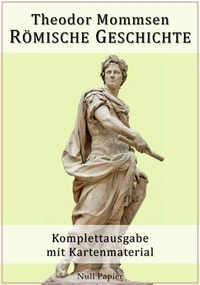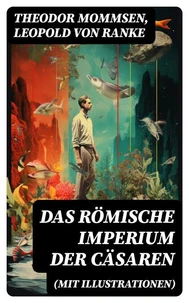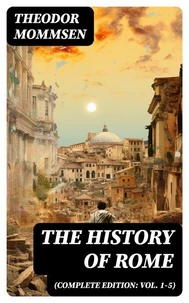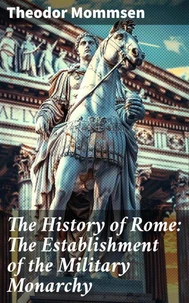The History of Rome: The Period Anterior to the Abolition of the Monarchy. Unveiling the Dawn of Rome: Transitioning from Monarchy to Republic
Par : ,Formats :
Disponible dans votre compte client Decitre ou Furet du Nord dès validation de votre commande. Le format ePub est :
- Compatible avec une lecture sur My Vivlio (smartphone, tablette, ordinateur)
- Compatible avec une lecture sur liseuses Vivlio
- Pour les liseuses autres que Vivlio, vous devez utiliser le logiciel Adobe Digital Edition. Non compatible avec la lecture sur les liseuses Kindle, Remarkable et Sony
 , qui est-ce ?
, qui est-ce ?Notre partenaire de plateforme de lecture numérique où vous retrouverez l'ensemble de vos ebooks gratuitement
Pour en savoir plus sur nos ebooks, consultez notre aide en ligne ici
- Nombre de pages278
- FormatePub
- ISBN859-65--4750659-1
- EAN8596547506591
- Date de parution12/08/2023
- Protection num.Digital Watermarking
- Taille665 Ko
- Infos supplémentairesepub
- ÉditeurGOOD PRESS
Résumé
In "The History of Rome: The Period Anterior to the Abolition of the Monarchy, " Theodor Mommsen meticulously traces the evolution of Roman society from its foundation through the final vestiges of monarchy. With a distinctive blend of narrative history and critical analysis, Mommsen employs a scholarly yet engaging literary style, bringing to life the complex socio-political landscapes and the cultural nuances of early Rome.
His work not only contextualizes the intricate interactions of power, philosophy, and governance but also delves into the ideological undercurrents that set the stage for the Republic's emergence. Theodor Mommsen, a prominent 19th-century German historian, was influenced by his experience in law, politics, and literature, which profoundly shaped his historiographical approach. His passion for antiquity and meticulous research into Roman history culminated in this seminal work, which reflects his belief in the importance of historical continuity and the lessons it imparts for contemporary society.
Recognized with the Nobel Prize in Literature in 1902 for his historical scholarship, Mommsen remains an authoritative voice on Roman history. This book is an essential read for scholars and enthusiasts of ancient history alike, offering rich insights into the formative years of Rome. Mommsen'Äôs blend of narrative vigor and erudition allows readers to appreciate not only Rome's historical legacy but also its impacts on modern governance and civic responsibility.
His work not only contextualizes the intricate interactions of power, philosophy, and governance but also delves into the ideological undercurrents that set the stage for the Republic's emergence. Theodor Mommsen, a prominent 19th-century German historian, was influenced by his experience in law, politics, and literature, which profoundly shaped his historiographical approach. His passion for antiquity and meticulous research into Roman history culminated in this seminal work, which reflects his belief in the importance of historical continuity and the lessons it imparts for contemporary society.
Recognized with the Nobel Prize in Literature in 1902 for his historical scholarship, Mommsen remains an authoritative voice on Roman history. This book is an essential read for scholars and enthusiasts of ancient history alike, offering rich insights into the formative years of Rome. Mommsen'Äôs blend of narrative vigor and erudition allows readers to appreciate not only Rome's historical legacy but also its impacts on modern governance and civic responsibility.
In "The History of Rome: The Period Anterior to the Abolition of the Monarchy, " Theodor Mommsen meticulously traces the evolution of Roman society from its foundation through the final vestiges of monarchy. With a distinctive blend of narrative history and critical analysis, Mommsen employs a scholarly yet engaging literary style, bringing to life the complex socio-political landscapes and the cultural nuances of early Rome.
His work not only contextualizes the intricate interactions of power, philosophy, and governance but also delves into the ideological undercurrents that set the stage for the Republic's emergence. Theodor Mommsen, a prominent 19th-century German historian, was influenced by his experience in law, politics, and literature, which profoundly shaped his historiographical approach. His passion for antiquity and meticulous research into Roman history culminated in this seminal work, which reflects his belief in the importance of historical continuity and the lessons it imparts for contemporary society.
Recognized with the Nobel Prize in Literature in 1902 for his historical scholarship, Mommsen remains an authoritative voice on Roman history. This book is an essential read for scholars and enthusiasts of ancient history alike, offering rich insights into the formative years of Rome. Mommsen'Äôs blend of narrative vigor and erudition allows readers to appreciate not only Rome's historical legacy but also its impacts on modern governance and civic responsibility.
His work not only contextualizes the intricate interactions of power, philosophy, and governance but also delves into the ideological undercurrents that set the stage for the Republic's emergence. Theodor Mommsen, a prominent 19th-century German historian, was influenced by his experience in law, politics, and literature, which profoundly shaped his historiographical approach. His passion for antiquity and meticulous research into Roman history culminated in this seminal work, which reflects his belief in the importance of historical continuity and the lessons it imparts for contemporary society.
Recognized with the Nobel Prize in Literature in 1902 for his historical scholarship, Mommsen remains an authoritative voice on Roman history. This book is an essential read for scholars and enthusiasts of ancient history alike, offering rich insights into the formative years of Rome. Mommsen'Äôs blend of narrative vigor and erudition allows readers to appreciate not only Rome's historical legacy but also its impacts on modern governance and civic responsibility.








